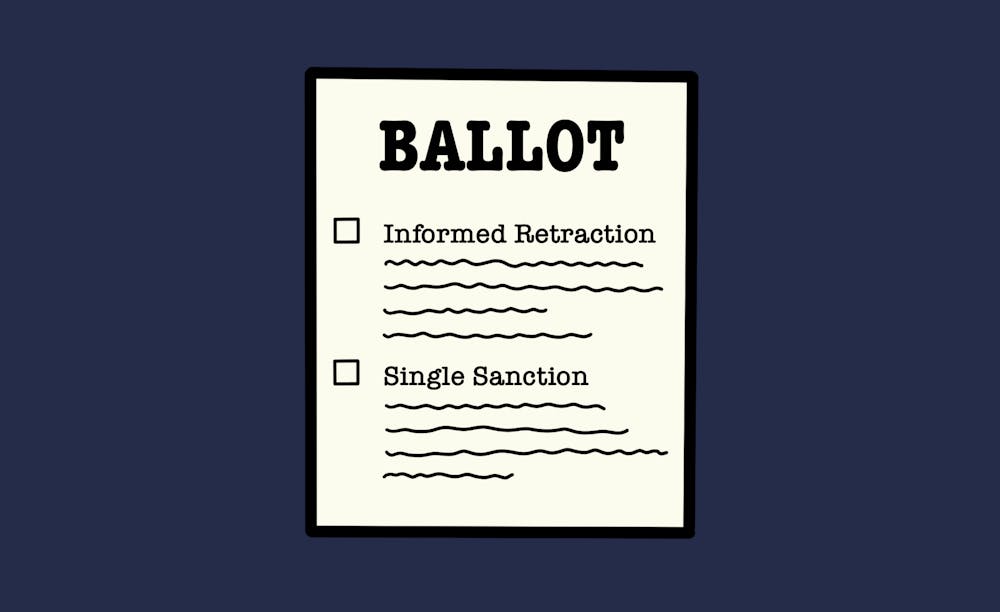It is time for a change. On your ballot this March, you will likely see two Honor referenda. One proposes to reduce the single sanction from expulsion to a two-semester leave of absence. The second expands the current Informed Retraction to allow students to plead guilty at any time prior to their hearing. As these referenda’s sponsor, I write to explain their merits and seek your support.
A two-semester sanction is rehabilitative. Mistakes should be instructive, not punitive. College should be a place for students to learn and grow as they develop the skills necessary to contribute to the workforce and civic life. To cultivate honest and compassionate citizens, our community needs to foster integrity instead of simply expelling those who make mistakes. This obligation to teach is especially necessary because students arrive here from a wide range of backgrounds and cultural traditions that often differ in how they prepare students for the academic demands of the University.
A two-semester sanction makes practical sense. Expulsion deters reporting and biases juries. The reporting rate for honor offenses is extraordinarily low. Honor processes roughly 40 to 60 reports annually, averaging 0.002 cases per enrolled student per year, despite an enrollment of approximately 25,000 and despite 4.7 percent of students admitting to having committed an honor offense. Students and professors are hesitant to report infractions to Honor in part due to the possibility of a resulting expulsion. In a recent report, nearly half of students surveyed indicated that expulsion deterred them from reporting. Some suggest that one in five faculty feels the same way. Similarly, some jurors are hesitant to impose expulsion because of its severity. Juries may thus “nullify” verdicts, meaning that they acquit based on their views of expulsion rather than on the evidence, despite believing in a student’s guilt. Though data is not reliably available on the reasoning of Honor juries, nullification is a well-studied phenomenon. Some scholars note that jury nullification plays a particularly substantial role where punishment is especially severe, such as in capital punishment cases. Reducing the Honor sanction to a meaningful but reasonable two-semester leave of absence would incentivize reporting. And it would mitigate instances of jury nullification so that the system can finally function properly while still holding students accountable for their actions.
A two-semester sanction is consistent. Compared to a multiple sanction system, a single sanction more effectively limits the potential for arbitrary application of different levels of punishment by juries. In a multiple sanction system, juries determine guilt and level of punishment. But unlike in the criminal justice system, juries in honor cases are not able to rely on precedent when making sanctioning decisions. This means that, under a multiple sanction system, two guilty students could face dramatically different levels of punishment despite having committed identical offenses. Replacing expulsion with a two-semester sanction that applies to everyone ensures that all guilty students are treated equally.
Further, this referendum is compatible with the development of a multiple sanction system in the future. The Honor Committee considered multiple sanction reform this term, but a significant majority favored replacing expulsion with a two-semester punishment as a compromise. No reform is perfect, but expulsion benefits no one – under any system. Until a viable framework for a multiple sanction system is fully developed, this referendum is a realistic first step.
A two-semester sanction will restore faith in the community of trust. Students are disillusioned with the Honor System. The core of the system – the threat of expulsion – does not foster what students appreciate about our community of trust. Students want to feel secure in leaving laptops in libraries. They want to benefit from flexible proctoring of exams. They want a community. Expulsion is not the way to sustain and build this community moving forward.
An expanded Informed Retraction also helps students. Currently, students may only plead guilty at the initial stage of their case. But after a plea window has closed, new evidence becomes available, further interviews are conducted and circumstances may evolve. Students should be able to make informed choices about their academic futures throughout the Honor process. Expanding the temporal scope of pleas ensures that they can.
This reform is effective. Prior referenda lacked procedural guidelines for what change would look like in practice. This proposal is clear – students found guilty, or who plead guilty before their hearing, may make amends and return after two semesters. The improved system can be implemented quickly. Future students may build upon this change to continue improving the system over time.
Finally, and most importantly, these referenda depend on you. To become certified for the ballot, the sanctioning referendum and informed retraction referendum petitions require 1,250 signatures. If you support giving all students a voice, add your name to these petitions. To pass, 60 percent of students must vote in their favor, with at least 10 percent of the student body participating. In the coming weeks, we will work hard to gain your support, answer your questions and partner with your organizational leaders. Make your voice heard.
Expelling students conveys that they are beyond redemption. But no student is beyond redemption. Everyone deserves a second chance. I ask that you sign the referenda petitions and vote “Yes” this spring so that future students inherit an Honor System that is compassionate, fair and works for everyone.
Christopher Benos is a member of the Honor Committee. Benos authored the 2022 Honor Constitutional Referenda Petitions. He can be reached at christopherbenos@virginia.edu.







